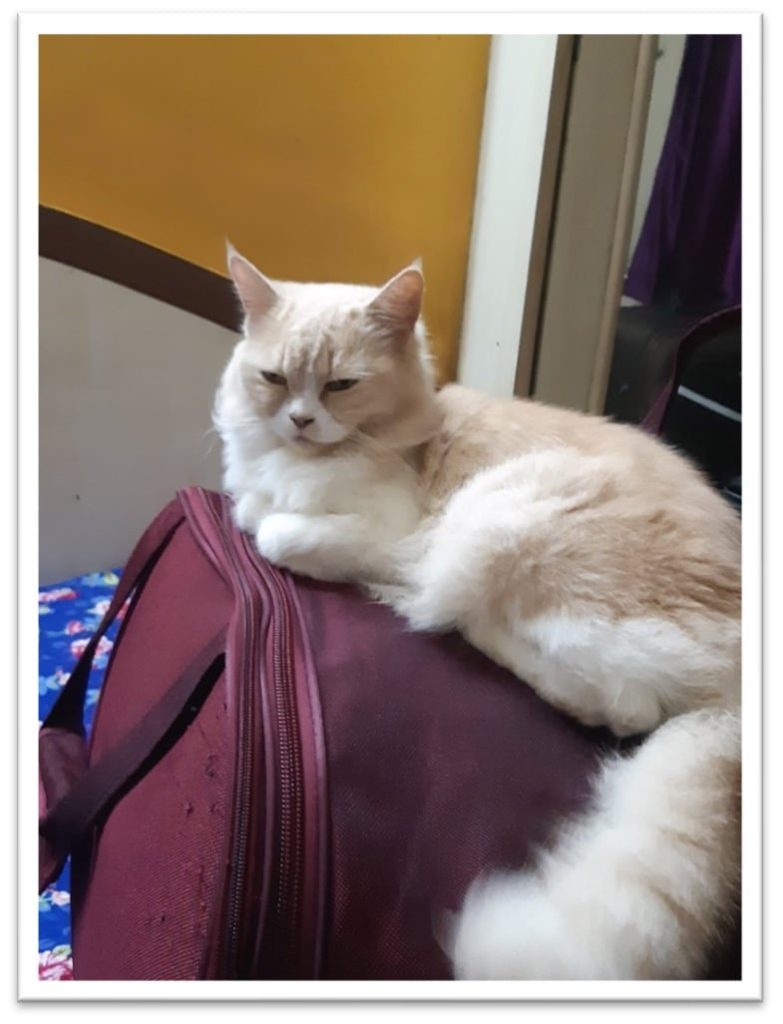Recently, I lost my beloved pet, an 8-year-old cat named Litchi. I’ve always loved cats, but my parents were once adamant about not having them in the house. They’d voice complaints about having to care for them, clean up after them, and deal with fur around the home, but deep down, they feared becoming attached. They knew they would end up loving these fur babies, and when the time came to part, it would be incredibly painful.
Despite these initial reservations, Litchi found her way into our family. We adopted her in 2017, when she was around 3.5 years old. At that time, I was away from home, so my mother and older brother were her primary caretakers. Gradually, they grew more comfortable around her. When my father and I returned home during the COVID-19 lockdown in 2020, Litchi became my dad’s favorite companion. His days began and ended with her presence, and she filled our home with warmth and love.
On June 5, 2024, Litchi passed away in her sleep due to kidney failure. She had been unwell for a long time, and our vet even suggested putting her to sleep, given her low chances of survival. My dad, however, chose not to hospitalize her, instead letting her live out her remaining days at home, surrounded by family. I am living in a different country and couldn’t be there to say goodbye, which made my grief all the more profound. My parents and brother struggled emotionally, returning each day to an empty home without Litchi waiting for them at the doorstep.
A few days after her passing, I spoke with my Reiki teacher. She offered me comfort and reminded me of the Ho’oponopono prayer—something I had practiced years ago but had since set aside.
For those unfamiliar with Ho’oponopono, it’s a Hawaiian mantra or prayer used as a healing tool to reconcile with oneself and cultivate self-compassion. It involves reciting four simple yet powerful statements:
I’m sorry.
Please forgive me.
Thank you.
I love you.
This prayer, originally written by Morrnah Simeona, invites us to take 100% responsibility for what is happening within and around us. When practiced regularly, it’s said to cleanse and heal us deeply. Like Reiki, Ho’oponopono is not a magic pill; it requires consistency and patience without fixating on outcomes.
As I began reciting the prayer each day, there were moments when it didn’t seem to help. I would still feel lost, struggle to sleep, and silently cry when thinking of Litchi. However, after a few days of persistent practice, I began to notice a subtle shift within myself. While memories of Litchi never left me, I started to accept her passing and find peace with it. Over the next few months, I continued this practice, and gradually, I felt more emotionally and mentally stable.
Even my father, who is agnostic and doesn’t believe in mantras or rituals, started reciting the Ho’oponopono prayer at my urging and out of love for Litchi. To my pleasant surprise, he shared that he felt comforted whenever he recited the prayer. Did the grief disappear? No, grief never truly vanishes; rather, we learn to live with it, and in doing so, we grow, understanding life’s uncertainties and deepening our gratitude for those we hold dear.


Here’s how I integrated Reiki practice with the Ho’oponopono prayer to navigate my grief:
- Sit in a comfortable place, and if you’re traveling or unable to find a private space, simply close your eyes, take three deep breaths, and center yourself.
- Mentally invoke the Reiki symbols or draw them in the air (depending on your surroundings) and repeat each symbol’s name three times.
- Imagine a white light beaming down on you. Call upon Reiki angels, the Universe, your guardian angels, or any deity you feel connected to. Ask for Reiki to flow through your system, releasing blocked energies in all seven of your primary chakras.
- Start performing self-Reiki. If you’re traveling, place your palms upward on your thighs with the intention that Reiki is flowing—the energy in your palms will give you cues.
- While performing self-Reiki, recite the Ho’oponopono prayer at each chakra for 3-5 minutes. When you’re done, end the session with gratitude toward the angels, deity, or higher power.
As I mentioned, the initial days might feel insignificant, and the mind may try to discourage you with pessimistic thoughts. The key is to maintain consistency. Continue with the practice, and soon you’ll begin to notice subtle changes. Over time, you’ll feel more at peace and learn to grow alongside your grief.
In memory of Litchi, this journey has been one of healing, acceptance, and profound love
Article by Nived Nambiar
Free eBook download: We’ve created an eBook with our best articles on this topic, and offer it for free to all our newsletter subscribers.


Nived Nambiar is a Level 3A practitioner from India and is currently based in Ontario, Canada. He’s completed his Master’s in Biotechnology, worked as a Market Researcher in Abu Dhabi, UAE, and has recently completed his second inning of education with Global Business Management.
Nived has been a Reiki practitioner for the past 11 years and intends to soon get attenuated to the Masters Level, to be more efficient in his work and eventually heal and teach people interested in being part of the Reiki world.
He can be contacted through his email nivedster@gmail.com and his Facebook page – www.facebook.com/nived.nambiar6





Leave a Reply